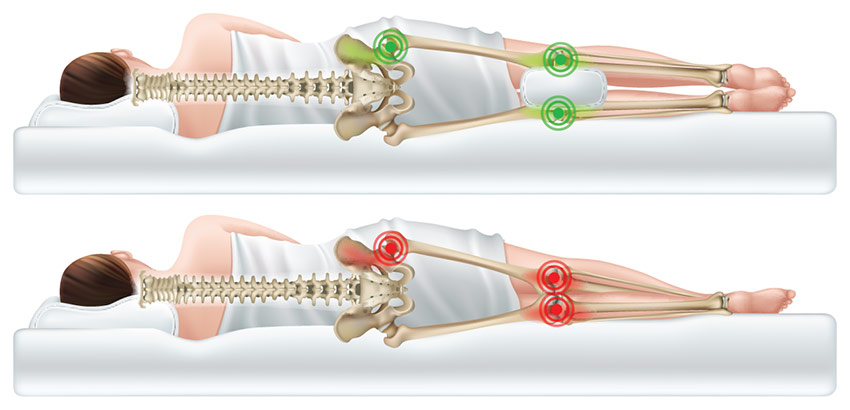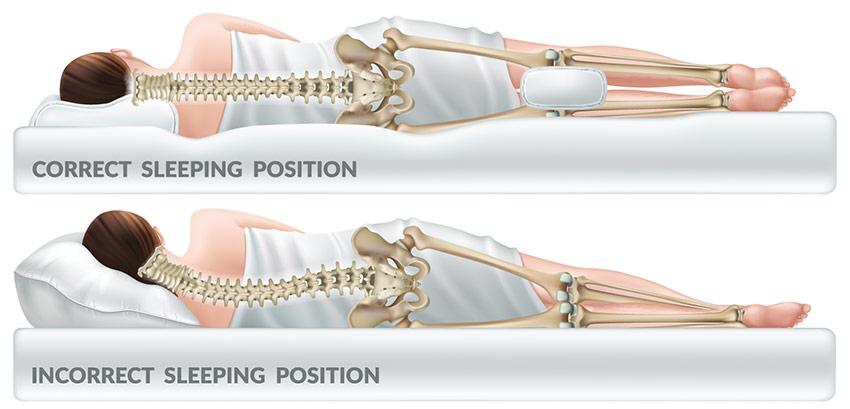Sleeping with Lower Back Pain
Lower back pain is a common condition, affecting up to 80% of individuals during their lifetime. Lower back pain can negatively affect your sleep leading to decreased quality and quantity of sleep. This is of concern because poor sleep can result in a variety of physiological and psychological effects that can become severe over time and lead to serious health problems including depression, Type II diabetes, obesity, high blood pressure, and coronary artery disease. If you’re suffering with lower back pain, chances are you’re having difficulty sleeping and are looking for some tips to improve your sleep.

In this article, we’ll outline some of the best sleeping positions for lower back pain and discuss some other tips to improve your sleep.
Sleeping on Your Back
Sleeping on your back with a pillow positioned under your knees to maintain the natural curvature in your lower back, and a small pillow positioned in the small of your back, is the ideal position if you suffer from lower back pain. This position distributes your body weight evenly across a large body surface area, which places the least amount of stress on your back, and also allows for a neutral spinal alignment.
However, while sleeping in this position is ideal, many people find that they are unable to sleep on their backs comfortably, so you may need to try one of the other positions discussed below.
Side Sleeping
Side sleeping, with a pillow positioned between your knees, is another good position if you suffer from lower back pain because it helps to maintain a neutral spinal alignment. However, it’s important to alternate sleeping on your left and right sides to avoid developing a muscle imbalance.

If your lower back pain is caused by a disc herniation, side sleeping in the fetal position is ideal because this position helps to open up the disc spaces between the vertebrae and relieve pressure on the affected nerve. Again, it’s important to alternate sleeping on your left and right sides to avoid developing a muscle imbalance.
Stomach Sleeping
Sleeping on your stomach should be avoided if you suffer from lower back pain as this position places an increased amount of stress on your lower back. However, if this is the only position that you’re able to sleep in, position a small pillow under your stomach and abdomen to help maintain the natural curve in your lower back. Additionally, use a very thin pillow under your head or skip the pillow all together to avoid excess strain on your spine.
Ensure Proper Spinal Alignment
Regardless of the sleeping position that you choose, it’s important to maintain neutral spinal alignment while you sleep. This means keeping your ears, shoulders, and hips aligned throughout the night.

Choosing an Appropriate Mattress and Pillow
Investing in a quality mattress and pillow is another way that you can help to improve your sleep if you suffer from lower back pain. A medium-firm mattress can help to ease lower back pain. Additionally, you should replace your mattress every 8 to 10 years because the mattress material breaks down over time, and becomes less supportive.
When selecting a pillow, choose one that is designed for the way you sleep the majority of the time (i.e. back sleeper, side sleeper, etc.). Using an appropriate pillow for your sleeping position will help to maintain a neutral spinal alignment.
Other Tips and Tricks
Sleeping in an optimal position and investing in a quality mattress and pillow can help to improve your sleep if you suffer from lower back pain, however, there are additional things you can do to improve your sleep, including:
- Get in and out of bed slowly and avoid jerky movements
- Regularly exercise (avoid vigorous exercise for 2 to 3 hours before bedtime)
- Strengthen your core
- Try gentle stretching before bed
- Improve your sleep hygiene
Conclusion
Sleeping with lower back pain can be difficult, but finding the best position as well as choosing an appropriate mattress and pillow, and following the additional tips mentioned in this article can go a long way to improving your sleep quality and quantity, which in turn will help to improve your quality of life.
You may also like: